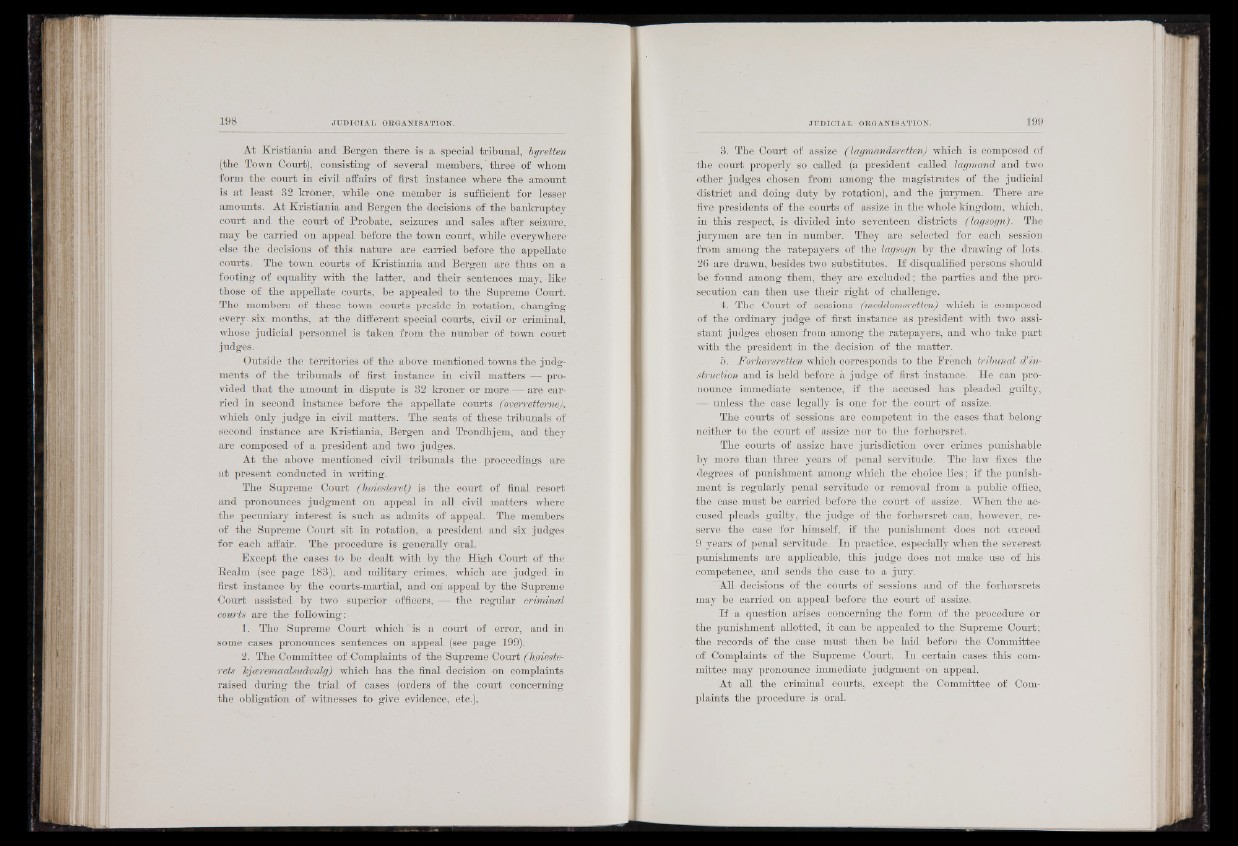
At Kristiania and Bergen there is a special tribunal, byretten
(the Town Court), consisting of several members, three of whom
form the court in civil affairs of first instance where the amount
is at least 32 kroner, while one member is sufficient for lesser
amounts. At Rristiamia and Bergen the decisions of the bankruptcy
court and the court of Probate, seizures and sales after seizure,
may be carried on appeal before the town court, while everywhere
else the decisions of this nature are carried before the appellate
courts. The town courts of Kristiania and Bergen are thus on a
footing of equality with the latter, and their sentences may, like
those of the appellate courts, be appealed to the Supreme Court.
The members of these town courts preside in rotation, changing
every, six months, at the different special courts, civil or criminal,
whose judicial personnel is taken from the number of town court
judges.
Outside the tèrritories of the above mentioned towns the judgments
of the tribunals of first instance in civil matters -S provided
that the amount in dispute is 32 kroner or mo,re 5 are carried
in second instance before the appellate courts (overretterne),
which only judge in civil matters. The seats of these tribunals of
second instance are Kristiania, Bergen and Trondhjem, and they
are composed of a president and two judges.
At the above mentioned civil tribunals the proceedings are
at present conducted in writing!
The Supreme Court (hgiesteret) is thè court of final resort
and pronounces judgment on appeal in all civil matters where
the pecuniary interest is such as admits of appeal. The members
of the Supreme Court sit in rotation, a president and six judges
for each affair. The procedure is generally oral.
Except the cases to be dealt with by the High Court of the
Realm (see page 183), and military erimes, which are judged in
first instance by the courts-martial, and oh appeal by the Supreme
Court assisted by two superior officers, the regular criminal
courts are the following:
1. The Supreme Court which.Ms a court of error, and in
some cases pronounces sentences on appeal, (see page 199).
2. The Committee of Complaints of the Supreme Court (h0ieste-
rets Icjmremaalsudvalg) which has the final decision on complaints
raised during the trial of cases (orders of the court concerning
the obligation of witnesses to give evidence, etc.).
3. The Court of assize (lagmandsretten) which is, composed of
the court properly so called (a president called lagmand and two
other judges chosen from among the magistrates of the judicial
district and doing duty by rotation), and the jurymen. There are
five presidents of the courts of assize in the whole kingdom, which,
in this respect, is divided into seventeen districts (lagsogn). The
jurymen are ten in number. They are selected for each session
from among the ratepayers of the lagsogn by the drawing of lots.
26 are drawn, besides two substitutes; If disqualified persons should
be found among them, they are excluded; the parties and the prosecution
can then use their right of challenge.
4. The Court ■ of sessions (meddomsretten) which is composed
of the ordinary judge of first instance as president with two assistant
judges chosen from among the ratepayers, and who take part
with the president in the decision of the matter.
5. Forh0rsretten which corresponds to the French tribunal d’in-
struction and is held before a judge of first instance. He can pronounce
immediate sentence, if the accused has pleaded guilty,
— unless the case legally is one for the court of assize.
The courts of sessions are competent in the cases that belong
neither to the court of assize nor to the forhorsret.
The courts of assize have jurisdiction over crimes punishable
by more than three years of penal servitude. The law fixes the
degrees of punishment among which the choice lies; if' the punishment
is regularly penal servitude or removal from a public office,
the case must be carried before the court of assize. When the accused
pleads guilty, the judge of the forhorsret can, however, reserve
the case for himself, if the punishment does not exceed
9 years of penal servitude. In practice, especially when the severest
punishments are applicable, this judge does not make use of his
competence, and sends the case to a jury.
All decisions of the courts of sessions and of the forhorsrets
may be carried on appeal before the court of assize.
H a question arises concerning the form of the procedure or
the punishment allotted, it can be appealed to the Supreme Court;
the records of the case must then be laid before the Committee
of Complaints of the Supreme Court. In certain cases this committee
may pronounce immediate judgment*on appeal.
At all the criminal courts, except the Committee of Complaints
the procedure is oral.